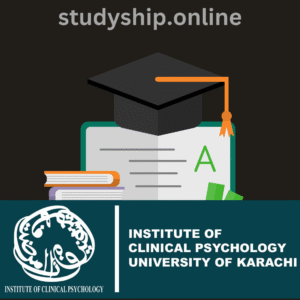The Institute of Clinical Psychology at the University of Karachi is committed to improving mental health practice, research, and education. It is one of the top institutes in Pakistan. Part of the esteemed University of Karachi (UoK), situated in Sindh’s capital city of Karachi, is well-known for its clinical psychology services and its impact on mental health. This comprehensive reference describes the institute’s programs, faculty, research projects, and community involvement in 2025. It is useful for students, professionals, and researchers interested in studying possibilities in this subject.
Overview of the Institute of Clinical Psychology University of Karachi
Seeing a need in Pakistan for trained mental health specialists, the University of Karachi’s Institute of Clinical Psychology was established. The institution has been a trailblazer in clinical psychology practice and education, having been established in response to the increasing frequency of psychological issues. Located in 118, Block 20, Abul Asar Hafeez Jalandhari Road, Gulistan-e-Johar, Karachi, this hospital provides state-of-the-art mental health therapy and has been authorized by the Pakistan Medical Commission (PMC).
The institution’s goals include elevating clinical psychology as a profession, fostering its expansion, and providing exceptional opportunities for training, teaching, and research. This resource is crucial for addressing mental health concerns in Pakistan as it integrates clinical services, academic programs, and community outreach.

Academic Programs Offered
Students interested in clinical psychology or a similar topic may choose from a variety of courses offered at the University of Karachi’s Institute of Clinical Psychology. Prospective psychologists and those pursuing further degrees may benefit from these programs. The following classes will be offered in 2025, according to the school’s official website:
1. Post Magistral Diploma in Clinical Psychology (PMDCP)
Duration: one to two years after completion of high school.
A master’s degree in psychology or a closely related discipline with a cumulative grade point average (CGPA) of 2.5 out of 4.0 is required for eligibility.
Objective: Acquire comprehensive knowledge of clinical evaluation, diagnosis, and treatment methods.
2. MPhil in Clinical Psychology
Given a duration of two years
You need to have a 3.0/4.0 cumulative grade point average or above to get your master’s degree or PRMDCP.
Emphasis: Clinical practice and advanced research culminating in a thesis.
Finally, a Doctor of Philosophy in Clinical Psychology program
3. PhD in Clinical Psychology
A Master of Philosophy (MPhil) in psychology or a closely related field with a cumulative grade point average (CGPA) of 3.0 out of 4.0 is required to be considered.
Psychotherapy, mental health policy, and other cutting-edge fields of study are now under scrutiny.

4. Short Courses and Certifications
For professionals looking to further their education, the institution provides short-term courses in topics including cognitive-behavioral therapy (CBT), psychological testing, and counseling methodologies.
Designed to meet international standards, these programs prepare students for careers in academia, clinical practice, or research. Visit http://icpuok.edu.pk/ for the official school website for further information on admission criteria.
Faculty and Research Excellence
Renowned experts in the fields of clinical psychology, psychotherapy, and mental health research make up the Institute of Clinical Psychology at the University of Karachi. Dr. Samira Maniar, who was an assistant professor at the institution from 1988 until 2001, is only one of many notable alumni who have contributed to its excellent reputation. To guarantee that students get mentoring from successful businesspeople, current faculty members are heavily involved in clinical practice and research.
The university’s academics edit and publish Psychology, the official peer-reviewed journal of Pakistan. The journal has been publishing articles on therapeutic methods, mental health, and psychological research since 1967, and its contributors come from all around the world. New research focuses include:
Crisis mental health services
Issues stemming from urban mental health
Cognitive behavior therapy’s efficacy
Members of the faculty and student body work together with the Higher Education Commission (HEC) and other international organizations to contribute to the global conversation around mental health.
Clinical Services and Community Engagement
Among the most prestigious institutions in Pakistan for the treatment of mental illness, the University of Karachi’s Institute of Clinical Psychology also serves as a university. Based on PMC’s verification, the Gulistan-e-Johar clinic provides:
Disorders such as schizophrenia, depression, and anxiety may be evaluated by psychological testing.
Psychodynamic and cognitive behavioral therapy, in addition to group and individual sessions, are all part of the therapeutic repertoire.
Counseling: Assistance with problems such as stress, disagreements with others, and obstacles in one’s professional life.
The public may schedule an appointment for the therapeutic offers of the institute via websites like Marham.pk or by calling the Gulistan-e-Johar location.
Some recent efforts that have included the community are:
In 2025, the institution and the University of Kent’s Psychology Department collaborated to host a conference titled “Psychological Support during Crises,” which aimed to meet the mental health requirements of those affected by catastrophes.
According to the KU Chinese Department’s “Building Life Skills in Youth: A Local Challenge,” the primary goal was to provide young people with the tools they need to overcome mental obstacles.
The university often organizes conferences and workshops to raise awareness about mental health issues; these activities are made even more effective by the active involvement of students.
These endeavors demonstrate the institute’s dedication to tackling Pakistan’s mental health issues via education and outreach.
Facilities and Resources
The Institute of Clinical Psychology at the University of Karachi has state-of-the-art facilities that facilitate both academic and clinical work:
Psychological evaluations and therapy training are conducted in clinical laboratories.
Library: A wealth of digital materials and a huge selection of psychological journals, such as the Pakistan Journal, are at your fingertips.
Centers for Research: Specific locations where doctoral and master’s degree candidates in mental health may do research.
Students and customers have easy access to the institution because of its Gulistan-e-Johar location and the UoK campus infrastructure, which provides additional assistance.
Admission Process for 2025
These are the requirements that prospective students at the University of Karachi’s Institute of Clinical Psychology must meet in order to enroll in classes:
You may submit your application online using the school’s portal at http://icpuok.edu.pk/ or the University of Karachi’s admissions website at http://www.uok.edu.pk/.
Verify that you are qualified by checking that you fulfill the prerequisites for the program, such as a master’s degree for PMDCP or an MPhil.
For postgraduate studies, the majority of programs need the HEC’s HAT or the University of Kent’s Admission Test.
One possible next step is to invite those on the shortlist for clinical training to an interview to further assess their qualifications.
Make the payment for the entrance fee according to the university’s pricing schedule.
In order to familiarize prospective students with the campus and its courses of study, the university often holds orientation events, such as the 2022 orientation program. Head on over to the official website to get the latest information on admissions deadlines.
Career Opportunities for Graduates
Employment opportunities for graduates of Karachi’s Institute of Clinical Psychology are high in:
Using clinical psychology in a variety of contexts, including private practice, hospitals, and clinics.
Those involved in academia and research are those who work in higher education, either as professors or as researchers.
Developing mental health programs in collaboration with regional and national NGOs, the World Health Organization, and other international groups
In the business world, wellness programs and counseling services are provided to employees.
With the institute’s stellar reputation and PMC accreditation, graduates get a leg up when applying for jobs.
Why Choose the Institute of Clinical Psychology University of Karachi?
University of Karachi’s Institute of Clinical Psychology is notable for:
Reputation: Highly regarded in the field of clinical psychology and related fields of study.
Clinical practice is integrated with classroom instruction.
Events like talks and workshops help bring attention to mental health issues in the community.
International Connections: Working with international organizations, such as the Fulbright Scholars program.
Challenges to Consider
Potential students need to know about:
Strong academic competence and test scores are necessities in today’s competitive admissions climate.
It may take some time for students from more rural regions to adjust to the hectic pace of Karachi.
Research funding may be competitive, despite the state-of-the-art facilities.
Conclusion
University of Karachi’s Institute of Therapeutic Psychology is a frontrunner in mental health education because to its excellent programs in therapy, research, and instruction. The school’s mission is to educate Pakistanis to become leaders in clinical psychology by addressing the country’s mental health issues. Visit http://icpuok.edu.pk/ or follow the institution on social media like Facebook and Instagram to learn more about its programs, admissions, and services. Join the University of Karachi’s Institute of Clinical Psychology in 2025 and help shape a better future.
